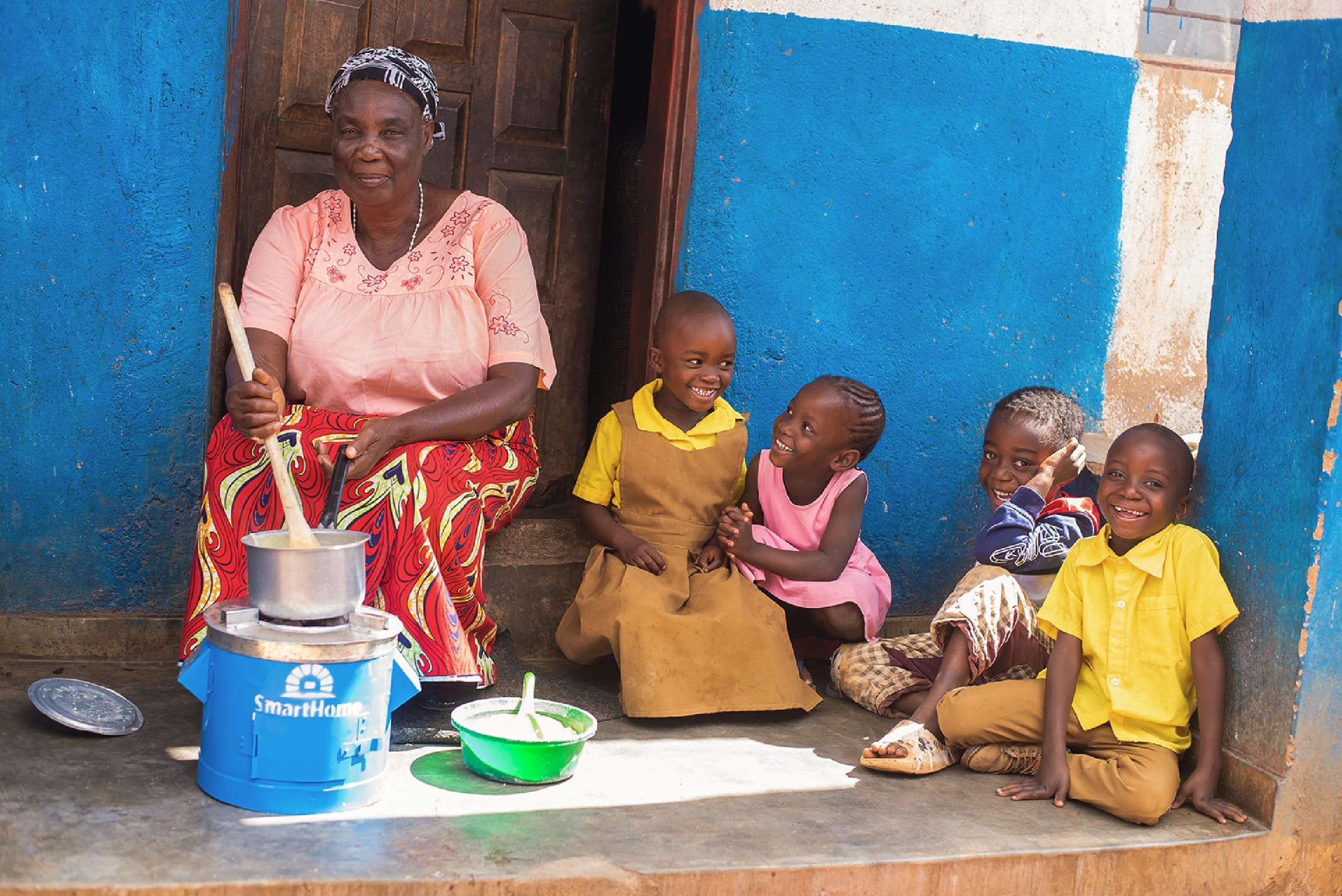Fuel-Efficient Household Cooking
We distribute cooking technology to meet diverse household needs, acknowledging that traditional practices and fuel accessibility vary across communities. By locally manufacturing and distributing fuel-efficient cookstoves, we offer practical solutions to those with no other option but to depend on charcoal for daily cooking.
Project Technology:
Fuel-efficient Cookstoves
Project Standards:
Project Locations:
Uganda, Tanzania, Malawi, Nigeria, Zambia, Ghana, Mozambique, DRC
Project Overview:
Nearly 2.5 billion people globally lack access to clean cooking facilities, contributing significantly to residential emissions in sub-Saharan Africa. Currently, 950 million people in the region rely on wood and charcoal for cooking, and this number is projected to rise to 1.7 billion by 2050. The lack of affordable electricity or access to it forces many to depend on biomass fuels, a major driver of deforestation.

Why Access to Fuel-Efficient Cooking is Essential to Fighting Energy Poverty:
Lack of Alternatives:
In the absence of electricity, families are forced to rely on biomass fuels, which are not only costly and time-consuming.
Breaking the Cycle:
Biomass dependence perpetuates a vicious cycle of energy poverty. Significant income spent on cooking fuel means less for education, healthcare, and other needs, trapping families in a cycle difficult to escape without targeted interventions.
Decarbonisation:
Every year, cooking with solid fuels produces as much emissions as the global airline industry. With growing populations and urbanization, the reliance on unclean cooking and its environmental footprint is set to increase, making the shift to fuel-efficient cooking methods more crucial than ever.
Combatting Deforestation:
The environmental impact of traditional cooking extends beyond individual households, contributing to deforestation at an alarming rate. Annually, the use of biomass for cooking contributes to the loss of 8.5 million hectares of forest, an area larger than Austria, causing soil erosion, biodiversity loss and threatening the lives of billions of people.
Residential solid fuel burning accounts for up to 58% of global black carbon emissions - which is 1,500 times more impactful on global warming than CO2.
The Technology Behind the Solution
Designed specifically for Households depend on charcoal based cooking:
45-55%
fuel savings due to
thermal efficiency.
Locally
Made
from materials available in the community.
5-7 people
Made for large households.
$100+
Direct savings for households on a weekly basis.

“I can never forget the faithful day I came across the UpEnergy team that helped me decide on the stove. The stove has really put a smile on my face because I can use the extra money saved on charcoal on other household needs”.
Oddus, Nigeria
Impact on Sustainable Development Goals
Fuel-efficient cooking can use up to 50% less charcoal, producing savings to typical household income contributing to poverty reduction.
Fuel-efficient cooking supports the well-being of families by reducing their dependency on solid fuel cooking.
Fuel-efficient stoves represent a more efficient use of energy, aligning with the goal of ensuring access to affordable, reliable, sustainable, and modern energy for all.
Household cooking is nearly universally done by women. Using efficient stoves cuts cooking time; reduces trips to fetch fuel; and time saved used for productive activities e.g. education and income generation.
UpEnergy’s fuel-efficient stoves are locally manufactured and distributed by a team employed by the project creating long-term employment opportunities. Additional end-users adopting the stoves save time that can be used for other productive activities.
UpEnergy stoves reduce emissions from cooking compared to traditional, inefficient stoves, contributing to climate change mitigation.
Reducing dependence on wood and charcoal as a fuel source helps in forest conservation and biodiversity protection.

Case Study:
Embracing Fuel-Efficient Cookstoves in Uganda
Nuuraat: Furniture Seller
Income: UGX 300,000/month (approx. $80)
Household: 6 Members
Location: Kampala-Kibuli, Uganda (Peri-Urban Area)
Nuuraat's Journey to Efficient Cooking:
At 23, Nuuraat, a furniture seller from the peri-urban area of Kampala, Uganda, supports a household of six, cooking three times a day on a traditional stove. She spent UGX 15,000 weekly on charcoal, a significant 20% of her income. After switching to a cleaner cookstove, recommended by a friend, Nuraat now enjoys several benefits.
Her fuel expenses have dropped drastically from UGX 15,000 to just UGX 5,000 per week. This efficient cookstove heats faster, is more durable, and emits less smoke and efficiency of her cooking routine. The savings have been repurposed to support her mother's food stall business and Nuuraat's positive experience led her recommending them to her mother in the village.
“I love my stove because it takes less time to heat up, cooks a lot faster and is more durable.”

Watch Nuuraat's Journey.
See first-hand how a fuel-efficient stove has changed her and her family’s life.
See Our Fuel Efficient Cooking Projects in Action!







Let’s Build Something Together
If you'd like to learn more or ask any questions, then do reach out to Polly, our dedicated Climate Finance Manager:
partnerships@upenergygroup.com
UpEnergy is a social enterprise headquartered in Kampala, Uganda.

























